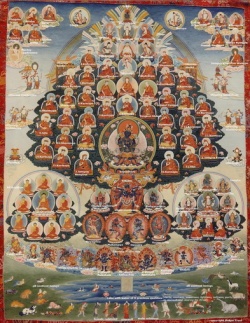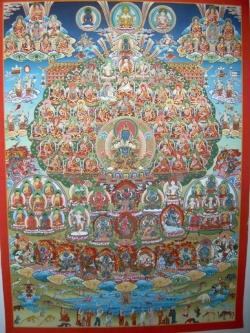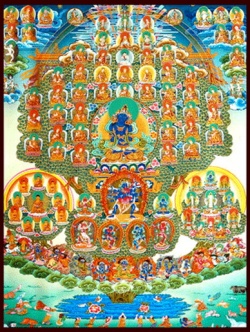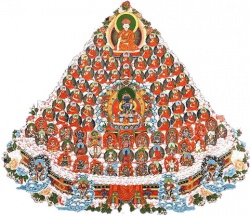Difference between revisions of "Kagyu Lineage"
| Line 1: | Line 1: | ||
[[File:Karma_kagyu_lineagetree.JPG|thumb|250px|]] | [[File:Karma_kagyu_lineagetree.JPG|thumb|250px|]] | ||
<poem> | <poem> | ||
| − | The Kagyupa School is particularly known for its emphasis on meditation practice. It originated with the Indian master Tilopa and spread throughout the Himalayas, including Tibet. Today, the Kagyu lineage of Buddhism is practiced worldwide. | + | The [[Kagyupa]] School is particularly known for its emphasis on [[meditation]] practice. It originated with the [[Indian]] [[master]] [[Tilopa]] and spread throughout the [[Himalayas]], including [[Tibet]]. Today, the [[Kagyu lineage]] of [[Buddhism]] is practiced worldwide. |
| − | Tilopa | + | [[Tilopa]] |
| − | The Kagyu lineage, originated with the great yogi Tilopa who lived in Northern india sometime around the 10th century A.D. Tilopa received the four special transmissions (T:bka-babs-bzhi) and mastered them. Although there is some discrepancy in historical sources regarding the identities of the masters associated with each of the four transmissions the most common consensus indicates that their sources are as follows: | + | The [[Kagyu lineage]], originated with the great [[yogi]] [[Tilopa]] who lived in {{Wiki|Northern india}} sometime around the 10th century A.D. [[Tilopa]] received the four special [[transmissions]] (T:bka-babs-bzhi) and mastered them. Although there is some discrepancy in historical sources regarding the {{Wiki|identities}} of the [[masters]] associated with each of the four [[transmissions]] the most common consensus indicates that their sources are as follows: |
| − | Origins of the Four Special Transmissions | + | Origins of the Four Special [[Transmissions]] |
| − | The first of the four came from Nagarjuna and consists of two tantras, the 'Sangwa Dupa Tantra' (Skt. Guhyasamaya) and the 'Denshi Tantra'. It also incorporates the practices called 'Illusory Body' (T: sgyu-lus) and '(T: pho-ba). | + | The first of the four came from [[Nagarjuna]] and consists of two [[tantras]], the '[[Sangwa Dupa]] [[Tantra]]' (Skt. [[Guhyasamaya]]) and the 'Denshi [[Tantra]]'. It also incorporates the practices called '[[Illusory Body]]' (T: [[sgyu-lus]]) and '(T: [[pho-ba]]). |
| − | The second special transmission came from Nakpopa and includes the tantra called 'Gyuma Chenmo' (Skt: Mahamaya) and the practice called 'Conscious Dreaming' (T: rmi-lam). | + | The second special [[transmission]] came from Nakpopa and includes the [[tantra]] called 'Gyuma Chenmo' (Skt: [[Mahamaya]]) and the practice called '[[Conscious]] Dreaming' (T: [[rmi-lam]]). |
| − | The third special transmission came from Lawapa. It includes the 'Demchok Tantra' and the practice of 'Clear Light' (T: od-gsal). | + | The third special [[transmission]] came from [[Lawapa]]. It includes the '[[Demchok]] [[Tantra]]' and the practice of '[[Clear Light]]' (T: [[od-gsal]]). |
[[File:Kagyu_Lineage9290f70a4.jpg|thumb|250px|]] | [[File:Kagyu_Lineage9290f70a4.jpg|thumb|250px|]] | ||
| − | The fourth was transmitted from Khandra Kalpa Zangmo and includes the tantra known as 'Gyepa Dorje' (Skt: Hevajra), and the practice called 'Tummo'. | + | The fourth was transmitted from Khandra [[Kalpa]] [[Zangmo]] and includes the [[tantra]] known as '[[Gyepa Dorje]]' (Skt: [[Hevajra]]), and the practice called '[[Tummo]]'. |
| − | Naropa | + | [[Naropa]] |
| − | The master Tilopa passed the four special transmissions to Naropa, who systematized them as the Six Yogas of Naropa that are considered a central theme in the Kagyu Lineage. | + | The [[master]] [[Tilopa]] passed the four special [[transmissions]] to [[Naropa]], who systematized them as the [[Six Yogas of Naropa]] that are considered a central theme in the [[Kagyu Lineage]]. |
| − | Marpa | + | [[Marpa]] |
| − | Naropa transmitted his knowledge to Marpa, the great translator who journeyed from Tibet to India in order to receive instructions and who subsequently returned to Tibet and spread the teachings of the Dharma. | + | [[Naropa]] transmitted his [[knowledge]] to [[Marpa]], the great [[translator]] who journeyed from [[Tibet]] to [[India]] in order to receive instructions and who subsequently returned to [[Tibet]] and spread the teachings of the [[Dharma]]. |
| − | Milarepa | + | [[Milarepa]] |
| − | Marpa's student Milarepa became one of the Tibet's great yogis. Through perseverance in the practice of Mahamudra and the Six Yogas of Naropa, he achieved profound realization of the ultimate nature of reality. | + | [[Marpa's]] student [[Milarepa]] became one of the {{Wiki|Tibet's}} great [[yogis]]. Through perseverance in the practice of [[Mahamudra]] and the [[Six Yogas of Naropa]], he achieved profound [[realization]] of the [[ultimate nature]] of [[reality]]. |
| − | Gampopa | + | [[Gampopa]] |
| − | Milarepa's transmission was carried on by Gampopa, the physician from Dagpo. He studied the Kadampa traditions, which is a gradual path that includes what is called the Lam Rim teachings. He also met Milarepa, and attained realization of ultimate reality under his guidance. He established monastic institutions, taught extensively and attracted many students. | + | [[Milarepa's]] [[transmission]] was carried on by [[Gampopa]], the {{Wiki|physician}} from Dagpo. He studied the [[Kadampa]] [[traditions]], which is a [[gradual path]] that includes what is called the [[Lam Rim]] teachings. He also met [[Milarepa]], and attained [[realization]] of [[ultimate reality]] under his guidance. He established [[monastic]] {{Wiki|institutions}}, taught extensively and attracted many students. |
| − | The Karmapas | + | The [[Karmapas]] |
[[File:RefugeTree 1C.JPG|thumb|250px|]] | [[File:RefugeTree 1C.JPG|thumb|250px|]] | ||
| − | It was the first Karmapa, Dusum Khyenpa, who received the complete Mahamudra transmission from Gampopa. He began the lineage of the Karmapas, which continues today. | + | It was the [[first Karmapa]], [[Dusum Khyenpa]], who received the complete [[Mahamudra]] [[transmission]] from [[Gampopa]]. He began the [[lineage]] of the [[Karmapas]], which continues today. |
| − | The Gyalwa Karmapa is the spiritual head of the Karma Kagyu lineage. The Karmapa represents the oldest line of reincarnated Tibetan Buddhist masters, dating to the 12th century. The current Karmapa, Trinley Thaye Dorje, is the 17th Karmapa. | + | The [[Gyalwa Karmapa]] is the [[spiritual]] head of the [[Karma Kagyu lineage]]. The [[Karmapa]] represents the oldest line of [[reincarnated]] [[Tibetan Buddhist]] [[masters]], dating to the 12th century. The current [[Karmapa]], [[Trinley Thaye Dorje]], is the [[17th Karmapa]]. |
| − | You can learn more about the Karmapa lineage here. | + | You can learn more about the [[Karmapa]] [[lineage]] here. |
| − | The Shamarpas | + | The [[Shamarpas]] |
| − | The first Shamarpa, Khedrup Drakpa Senge (1283-1349), was the principal disciple of the third Karmapa, Rangjung Dorje. Rangjung Dorje gave this disciple a ruby-red crown and the title Shamarpa, establishing the second line of reincarnate lamas in Tibetan Buddhism, Karmapa being the first. This was the fulfillment of a prediction of the second Karmapa, Karma Pakshi, who said "Future Karmapas will manifest in two forms". When the fourth Karmapa, Rolpe Dorje, returned the red crown to the second Shamarpa, he recalled Karma Pakshi's prediction, saying, "You are the one manifestation, while I am the other. Therefore, the responsibility to maintain the continuity of the teachings of the Kagyu lineage rests equally on you as it does on me." | + | The first [[Shamarpa]], [[Khedrup Drakpa Senge]] (1283-1349), was the [[principal]] [[disciple]] of the [[third Karmapa]], [[Rangjung Dorje]]. [[Rangjung Dorje]] gave this [[disciple]] a ruby-red {{Wiki|crown}} and the title [[Shamarpa]], establishing the second line of [[reincarnate lamas]] in [[Tibetan Buddhism]], [[Karmapa]] being the first. This was the fulfillment of a {{Wiki|prediction}} of the [[second Karmapa]], [[Karma Pakshi]], who said "Future [[Karmapas]] will [[manifest]] in two [[forms]]". When the fourth [[Karmapa]], [[Rolpe Dorje]], returned the red {{Wiki|crown}} to the second [[Shamarpa]], he recalled [[Karma Pakshi's]] {{Wiki|prediction}}, saying, "You are the one [[manifestation]], while I am the other. Therefore, the {{Wiki|responsibility}} to maintain the continuity of the teachings of the [[Kagyu lineage]] rests equally on you as it does on me." |
| − | The present (14th) Shamarpa is Mipham Chokyi Lodro, born in Derge, Tibet in 1952. At age four he was recognized by his uncle the 16th Karmapa. After the death of the 16th Karmapa in 1981, the Shamarpa recognized Thaye Dorje as the 17th Karmapa in 1994. The 14th Shamarpa presently resides in India. | + | The {{Wiki|present}} (14th) [[Shamarpa]] is [[Mipham Chokyi Lodro]], born in [[Derge]], [[Tibet]] in 1952. At age four he was [[recognized]] by his uncle the [[16th Karmapa]]. After the [[death]] of the [[16th Karmapa]] in 1981, the [[Shamarpa]] [[recognized]] [[Thaye Dorje]] as the [[17th Karmapa]] in 1994. The 14th [[Shamarpa]] presently resides in [[India]]. |
| − | You can learn more about the Shamarpa lineage here. | + | You can learn more about the [[Shamarpa]] [[lineage]] here. |
| − | The Four Main Kagyu Schools and the Eight Branches | + | The Four Main [[Kagyu Schools]] and the Eight Branches |
| − | Four disciples of Gampopa founded the four main Kagyu schools: | + | Four [[disciples]] of [[Gampopa]] founded the four main [[Kagyu schools]]: |
[[File:Mahamudra_lineage_lama.JPG|thumb|250px|]] | [[File:Mahamudra_lineage_lama.JPG|thumb|250px|]] | ||
| − | Babrom Kagyu founded by Babrom Dharma Wangchuk | + | [[Babrom Kagyu]] founded by Babrom [[Dharma]] [[Wangchuk]] |
| − | Pagdru Kagyu founded by Phagmo Drubpa Dorje Gyalpo | + | Pagdru [[Kagyu]] founded by Phagmo Drubpa [[Dorje]] [[Gyalpo]] |
| − | Tsalpa Kagyu founded by Shang Tsalpa Tsondru Drag | + | [[Tsalpa Kagyu]] founded by [[Shang]] [[Tsalpa]] Tsondru Drag |
| − | Kamtsang Kagyu, also known as the Karma Kagyu School founded by Karmapa Dusum Khyenpa. | + | [[Kamtsang Kagyu]], also known as the [[Karma Kagyu School]] founded by [[Karmapa Dusum Khyenpa]]. |
| − | The eight branches of the Kagyu lineage originated from Gampopa's disciple, Phagmo Drubpa: | + | The eight branches of the [[Kagyu lineage]] originated from [[Gampopa's]] [[disciple]], Phagmo Drubpa: |
| − | Taglung Kagyu | + | Taglung [[Kagyu]] |
| − | Trophu Kagyu | + | [[Trophu Kagyu]] |
| − | Drukpa Kagyu | + | [[Drukpa Kagyu]] |
| − | Martsang Kagyu | + | [[Martsang Kagyu]] |
| − | Yerpa Kagyu | + | [[Yerpa]] [[Kagyu]] |
| − | Yazang Kagyu | + | Yazang [[Kagyu]] |
| − | Shugseb Kagyu | + | Shugseb [[Kagyu]] |
| − | Drikung Kagyu | + | [[Drikung Kagyu]] |
| − | The four main lineages are sometimes known as major in that they originate with Gampopa himself, whereas the branches are sometimes referred to as minor lineages because they originate from Gampopa's disciple Phagmo Drubpa. This does not reflect on the instructions they contain-- they are equal in that respect. | + | The four main [[lineages]] are sometimes known as major in that they originate with [[Gampopa]] himself, whereas the branches are sometimes referred to as minor [[lineages]] because they originate from [[Gampopa's]] [[disciple]] Phagmo Drubpa. This does not reflect on the instructions they contain-- they are {{Wiki|equal}} in that [[respect]]. |
| − | Nowadays, among the four main Kagyu lineages, only the Karma Kagyu remains prevalent. Among the eight branches of the Kagyu lineage only the Taglung, Drukpa and Drikung Kagyu still exist as independent lineages. | + | Nowadays, among the four main [[Kagyu]] [[lineages]], only the [[Karma Kagyu]] remains prevalent. Among the eight branches of the [[Kagyu lineage]] only the Taglung, [[Drukpa]] and [[Drikung Kagyu]] still [[exist]] as {{Wiki|independent}} [[lineages]]. |
| − | One can distinguish several transmissions within each lineage. However, all major buddhist traditions in Tibet have a lineage of the Pratimoksha-vows and a lineage of the Bodhisattva-vows. | + | One can distinguish several [[transmissions]] within each [[lineage]]. However, all major [[buddhist traditions]] in [[Tibet]] have a [[lineage]] of the Pratimoksha-vows and a [[lineage]] of the Bodhisattva-vows. |
</poem> | </poem> | ||
{{R}} | {{R}} | ||
Revision as of 21:00, 29 January 2014
The Kagyupa School is particularly known for its emphasis on meditation practice. It originated with the Indian master Tilopa and spread throughout the Himalayas, including Tibet. Today, the Kagyu lineage of Buddhism is practiced worldwide.
Tilopa
The Kagyu lineage, originated with the great yogi Tilopa who lived in Northern india sometime around the 10th century A.D. Tilopa received the four special transmissions (T:bka-babs-bzhi) and mastered them. Although there is some discrepancy in historical sources regarding the identities of the masters associated with each of the four transmissions the most common consensus indicates that their sources are as follows:
Origins of the Four Special Transmissions
The first of the four came from Nagarjuna and consists of two tantras, the 'Sangwa Dupa Tantra' (Skt. Guhyasamaya) and the 'Denshi Tantra'. It also incorporates the practices called 'Illusory Body' (T: sgyu-lus) and '(T: pho-ba).
The second special transmission came from Nakpopa and includes the tantra called 'Gyuma Chenmo' (Skt: Mahamaya) and the practice called 'Conscious Dreaming' (T: rmi-lam).
The third special transmission came from Lawapa. It includes the 'Demchok Tantra' and the practice of 'Clear Light' (T: od-gsal).
The fourth was transmitted from Khandra Kalpa Zangmo and includes the tantra known as 'Gyepa Dorje' (Skt: Hevajra), and the practice called 'Tummo'.
Naropa
The master Tilopa passed the four special transmissions to Naropa, who systematized them as the Six Yogas of Naropa that are considered a central theme in the Kagyu Lineage.
Marpa
Naropa transmitted his knowledge to Marpa, the great translator who journeyed from Tibet to India in order to receive instructions and who subsequently returned to Tibet and spread the teachings of the Dharma.
Milarepa
Marpa's student Milarepa became one of the Tibet's great yogis. Through perseverance in the practice of Mahamudra and the Six Yogas of Naropa, he achieved profound realization of the ultimate nature of reality.
Gampopa
Milarepa's transmission was carried on by Gampopa, the physician from Dagpo. He studied the Kadampa traditions, which is a gradual path that includes what is called the Lam Rim teachings. He also met Milarepa, and attained realization of ultimate reality under his guidance. He established monastic institutions, taught extensively and attracted many students.
The Karmapas
It was the first Karmapa, Dusum Khyenpa, who received the complete Mahamudra transmission from Gampopa. He began the lineage of the Karmapas, which continues today.
The Gyalwa Karmapa is the spiritual head of the Karma Kagyu lineage. The Karmapa represents the oldest line of reincarnated Tibetan Buddhist masters, dating to the 12th century. The current Karmapa, Trinley Thaye Dorje, is the 17th Karmapa.
You can learn more about the Karmapa lineage here.
The Shamarpas
The first Shamarpa, Khedrup Drakpa Senge (1283-1349), was the principal disciple of the third Karmapa, Rangjung Dorje. Rangjung Dorje gave this disciple a ruby-red crown and the title Shamarpa, establishing the second line of reincarnate lamas in Tibetan Buddhism, Karmapa being the first. This was the fulfillment of a prediction of the second Karmapa, Karma Pakshi, who said "Future Karmapas will manifest in two forms". When the fourth Karmapa, Rolpe Dorje, returned the red crown to the second Shamarpa, he recalled Karma Pakshi's prediction, saying, "You are the one manifestation, while I am the other. Therefore, the responsibility to maintain the continuity of the teachings of the Kagyu lineage rests equally on you as it does on me."
The present (14th) Shamarpa is Mipham Chokyi Lodro, born in Derge, Tibet in 1952. At age four he was recognized by his uncle the 16th Karmapa. After the death of the 16th Karmapa in 1981, the Shamarpa recognized Thaye Dorje as the 17th Karmapa in 1994. The 14th Shamarpa presently resides in India.
You can learn more about the Shamarpa lineage here.
The Four Main Kagyu Schools and the Eight Branches
Four disciples of Gampopa founded the four main Kagyu schools:
Babrom Kagyu founded by Babrom Dharma Wangchuk
Pagdru Kagyu founded by Phagmo Drubpa Dorje Gyalpo
Tsalpa Kagyu founded by Shang Tsalpa Tsondru Drag
Kamtsang Kagyu, also known as the Karma Kagyu School founded by Karmapa Dusum Khyenpa.
The eight branches of the Kagyu lineage originated from Gampopa's disciple, Phagmo Drubpa:
Taglung Kagyu
Trophu Kagyu
Drukpa Kagyu
Martsang Kagyu
Yerpa Kagyu
Yazang Kagyu
Shugseb Kagyu
Drikung Kagyu
The four main lineages are sometimes known as major in that they originate with Gampopa himself, whereas the branches are sometimes referred to as minor lineages because they originate from Gampopa's disciple Phagmo Drubpa. This does not reflect on the instructions they contain-- they are equal in that respect.
Nowadays, among the four main Kagyu lineages, only the Karma Kagyu remains prevalent. Among the eight branches of the Kagyu lineage only the Taglung, Drukpa and Drikung Kagyu still exist as independent lineages.
One can distinguish several transmissions within each lineage. However, all major buddhist traditions in Tibet have a lineage of the Pratimoksha-vows and a lineage of the Bodhisattva-vows.



